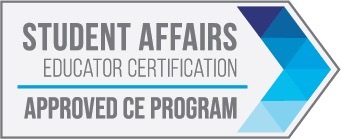
Enacting Student Well-being on Your Campus: Practical Steps for Practitioners and Decision-makers
- Registration Closed
As institutions look to initiate or to integrate their well-being efforts across campus better, they have a range of questions and needs from tactical to strategic. This webinar will help practitioners and decision-makers create a research-based case for investing time and resources in
Five primary topics will be explored in this webinar:
- Making the case for investment of time and resources in student well-being, based on research and ROI for institutions
- Definitions of well-being and where well-being work takes place on campus (hint: it’s not only in the Counseling and Health Center!)
- What we know from national surveys about the current state of undergraduate student well-being, using the Student Well-being Institutional Support Survey (SWISS), the National Survey of Student Engagement (NSSE), the American College Health Association’s National College Health Assessment (NCHA).
- How to strategically use assessment to generate buy-in and support from all levels of campus, including Cabinet
- Keeping the momentum for this work alive and well after you launch an initiative
By attending this webinar, participants will learn:
- The importance of investing in student well-being and how to make the case for well-being work on their own campuses.
- What the national picture of student well-being looks like currently, including areas of success and opportunity
- How to take well-being data and research to action and rally others on campus around the cause
- Methods for keeping excitement and investment in well-being work a priority for the institution.
Bridget Yuhas
Director | Student Affairs Assessment & Strategy Executive Director | Institute for Well-being
Butler University
Dr. Bridget Yuhas has 20 years of experience in higher education, including five years at the National Survey of Student Engagement (NSSE). She has presented original research on student well-being at NASPA Strategies, NASPA Annual Conference, ACHA Annual Conference, Qualtrics X4 Summit, Assessment Institute, NIRSA Annual Conference, First-Year Experience Conference, and NIRSA’s Summer of Learning; and has partnered with the National Wellness Institute to study professional well-being practitioner competencies both within and outside of higher education. Dr. Yuhas developed and leads the Student Well-being Institutional Support Survey (SWISS) and serves as the Executive Director for Student Affairs at Butler University.
Continuing Education Credits
Participants who complete the course will be eligible for Continuing Education (CE) credits in either the Core Student Affairs Educator Certification (CSAEd™)
NASPA has been approved by the Higher Education Consortium for Student Affairs Certification to provide CE credit for Certified Student Affairs Educators (CSAEd). NASPA is solely responsible for all aspects of this program.
Guidelines for earning CE credit:
1 CE is awarded for attending this live session OR watching it on-demand for ONE category of Continuing Education. You can not receive more than 1 credit hour total.
No partial credit will be rewarded.
Participants must also complete the feedback survey in the Online Learning Community.
Reach out to virtuallearning@naspa.org for the continuing education certificate for Social Justice and Inclusion.
To receive CSAEd credit, attendees must complete the Feedback Survey in the online event offering the certification. Once the survey is completed, your Certificate will be available in the event modules. The Certificate of Completion, which will show the event and credit earnings, is available for download and/or print from the event in your Online Learning Community.
